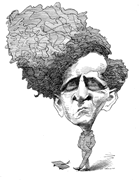 “What is your aim in Philosophy?”
“What is your aim in Philosophy?”
“To show the fly the way out of the fly-bottle” (Philosophical Investigations) – Wittgenstein
Wittgenstein thought that the pursuit of philosophy in its traditional sense is pointless. Philosophers who scoured far and wide for a structured logical form applicable to everything were deluded and wasting their time, much like a fly who constantly tries to escape a transparent bottle by banging against the side. Wittgenstein saw it as his job to show these tenacious philosophers out of the top of the fly-bottle and to see philosophy for what it really is – a futile attempt to find an all-encompassing logical form of thought behind the mess that is ordinary language…
Sounds more and more plausible every day, especially after all that Epistemology… I still came out knowing nothing o.O;
Well, some philosophers don’t quite see eye-to-eye with Wittgenstein… ^_^;
“Wittgenstein very fittingly compares a certain type of philosopher with a fly in a bottle, going on and on, buzzing about. And he says it is the task of his philosophy to show the fly the way out of the bottle. But I think it is Wittgenstein himself who is in the bottle and never finds his way out of it; and I certainly don’t think he has shown anybody else the way out.”
–Karl Popper (1902-1994), author of The Logic of Scientific Discovery and The Open Society and Its Enemies. (Quoted from Modern British Philosophy, edited by Bryan Magee [St. Martin’s Press, 1971])
Source: Philosophy Confidential
Read here for more information about Wittgenstein
Wittgenstein image from:The D.B. Weldon Library









I always saw Wittgenstein’s philosophy as one of total abnegation. As a teenager, I may have agreed with him and his simplified version of how it is to come to understand (well “describe”, heaven forbid, to explain) the world. But as a teenager, I was just beginning my journey. Wittgenstein appeals to those merely beginning a philosophical journey, whether young or old. I agree with Popper on this one, not necessarily on his closed-minded politics. But reducing (philosophical) understanding to understanding language games is incredibly dangerous and discourages real inquiry. To boot, Wittgenstein uses the word ‘shew’, not ‘show’. That says it all. What is Wittgenstein’s greatest lesson to aspiring young philosophers? Be pretentious. Pretend you are smarter than other people. Do not respect people who have a greater imagination, are more creative and more genuine in their “analysis”. Ignore deep philosophical thinking at all cost. Just pretend to be “philosophical”. Smoke a pipe.
Obviously, a great part of the philosophical confusion initiating from linguistic correlation with concepts which have been projected to the minds through their vague and misleading function. Thus, the bottle metaphor is more than a theory, I think.It’s a sharp tool to remove “many” of those wrong question that may lead to dead blocks ways.
As a scientist and amateur philosopher, I have read lots of Popper and some Wittgenstein. To be honest, I find them both brilliant and I have taken away nuggets from each of them. I side with Popper, however, against Wittgenstein’s claim that philosophy is merely a matter of solving puzzles. One must concede to Wittgenstein that much of philosophy IS only that, but there are also philosophical problems of monumental importance such as free will, the problem of evil, and ethics. I d not think it is fruitful to dismiss these as mere “puzzles.”Philip Hansten
Philosopheers’ structures are only pointless if they are taken as a way of showing the ‘truth’ about the world out there. But philosophers must and will continue to form their theoretical structures, because that is the only way to put sense into an otherwise senseless world. If only they knew they were building imaginary worlds, like poets, for ntheir own comfort and pleasure, their work would not be pointless.
D. R. Khashaba
Independent philosopher
one cannot quote Popper and settle a question concerning Wittgenstein anymore than one can quote Wittgenstein and settle a question concerning philosophy.
there are lots of kinds of philosophy he didn’t mind (ethics for example), but he was certainly right about a few things. Like Sartre who tried to define ‘nothing’ as some kind of real ‘something’ because of the way it is used in language i.e. “what is in that room” – “nothing is in that room”
silly philosopher… :P
I don’t think that Wittgenstien thought that traditional philosophy was pointless, only that it was a misguided approach and that a new approach might help us to better understand the nature of philosophical confusion.